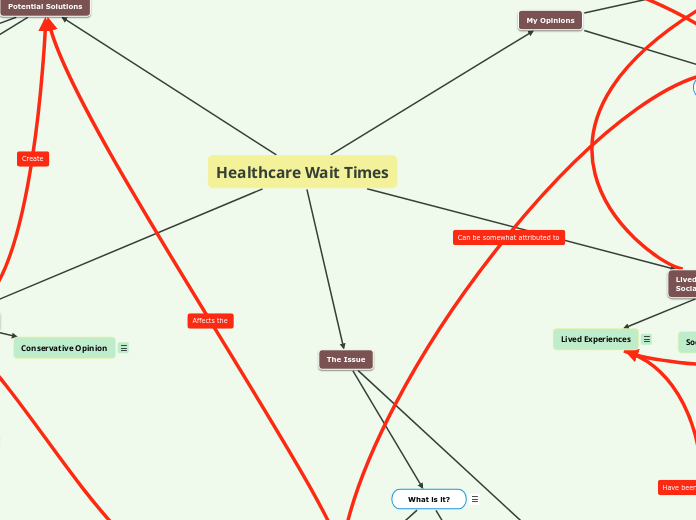Healthcare Wait Times
Potential Solutions
Funding Medical Staff + Equipment
One of the most obvious yet effective solutions to shorten hospital wait times is through more funding from the government (to gain more Medical staff and equipment). This has been a recurring issue in Ontario, due to the ineffective policies and funding in place. For instance, in comparison to other OECD countries (which are mostly comprised of first-world countries), Ontario had approximately 2.32 Physicians per 1000 people in 2021, which was one of the lowest within the entire group. This is extremely concerning, as the senior population is forecasted to grow by an additional 20 million people by 2046, which will require immense amounts of quality healthcare (Ontario Medical Association, 2021). In order to achieve this goal of more funding for medical staff and equipment, the government must allocate more funds from other non-essential aspects of the healthcare system (eg community programs) and be held accountable to deliver on their promises.
This image shows the Physicians per 1000 people. Notice how most European and first world countries countain between 3-4 and 4-5 physicians per 1000.
Creating Integrated Ambulatory Centres
As the wait times for Healthcare services have increased, there have been more calls for a separate centre for simple procedures (known as Integrated Ambulatory centres.) Through this method, complex surgeries would continue to operate within hospitals with more resources, while day surgeries would operate in new specially-dedicated centres. Although this process would take between 5 to 8 years, this concept could increase the efficiency, quality and funding of hospitals (Ontario Medical Association, 2022) while decreasing wait times over the long term. To achieve this goal, the Provincial government needs to look at the benefits of this model in comparison to the cost, while creating plans for relocation for some of the medical staff (if necessary).
Graph of the benefits of this model (according to the Ontario Medical Association).
Video from the Ontario Medical Association describing this idea.
Creating a different Strategy
Currently, many hospitals' waitlists consist of patient-selected medical staff. As a result, many individuals are forced to wait for long periods of time for their preferred choice. Through the proposed single entry model, patients would be put on a waitlist for the next available doctor instead of their favourite, which could drastically increase hospital efficiency. As a result, the wait times for basic services would improve, with many patients being able to receive their care faster regardless of the speed of their preferred doctor, while the backlogged surgeries are slowly completed. To achieve this goal, the Provincial government must incentivize hospitals to switch, while medical staff need to be educated on the benefits of this model (as currently, the pushback has been mostly from medical staff and hospitals).
A video which explains how a Single entry system works and benefits the public.
Note: Although the video talks about the entire country, the general ideas throughout this video can be applied to the province of Ontario.
Support for Private Hospitals
By supporting funding for Private Hospitals, there will be more options for everyday citizens to choose from, and could drastically benefit the amount of pressure that our entire current healthcare system is facing. This system has already been implemented and has been proved successful in other countries with universal healthcare. For example, in Australia (where the per capita spending on healthcare is only about $300 in comparison to Ontario), the wait times are much shorter, due to the solid mix of both private and public hospitals (Moir, 2020). Through the implementation of more private hospitals, I believe that more patients can expect to receive their healthcare in a timely manner, regardless of whether it is essential or not while the backlogged surgeries will decrease and patient satisfaction will increase. To achieve this goal, the provincial government must lift the ban on Private Hospitals (enacted through the Private Hospitals Act of 1980), and allow for more diversity within the healthcare space. Furthermore, more medical personnel should be hired, to accommodate both of these systems through more training and incentives.
My Opinions
Government's Current Response
Based on my research, I believe that the Government has currently done very little to combat this issue. In the past decade, all forms of government within Canada and Ontario have promised to drastically shorten healthcare wait times, although I personally believe none have provided substantial and recognizable results.
Federal
Although the federal government does not have the ability to change provincial healthcare, the prime minister has promised many funding changes within the overall healthcare system throughout the country. As the prime minister, Trudeau has promised during a meeting (which included an Ontario Liberal Candidate, Anita Annand) to spend an additional $6 billion to shorten waitlists, $3 billion to hire 7500 medical staff, $400 million for primary care and other promises such as conditional health transfers (Canadian Press Staff, 2021), yet these actions have not been fully implemented as of February 2022. The Liberals have also refused to implement laws that would make Private healthcare hospitals widespread across the country. In my opinion, I agree with the federal government's policy to spend more money on medical staff and waitlists to reduce wait times. However, I personally believe that their decision to reject private healthcare is a terrible choice, as it forces people of all socioeconomic backgrounds into a single system that doesn't have enough room to accommodate them all and creates less freedom of choice for the consumers.
Trudeau's full interview discussing wait times in 2021.
Provincial
In the past few years, The Ford Administration has promised to spend $324 million in funding for hospitals to catch up on surgical wait times through an increase in equipment, while hiring 5,000 nurses and other medical personnel, yet these actions have also not been implemented. Furthermore, the PCs have supported the idea of Private hospitals and plans to expand it, handing out thousands of new contracts with private hospitals. Based on my previous experiences, I wholeheartedly support these decisions (as it could potentially create more capacity), however, the government's slow speed in implementing these proposed actions has been extremely saddening and concerning.
My Beliefs and Values on Wait Times
My beliefs and values on this issue stem from my previous experiences within hospitals and Ideology, as I believe that this issue can be easily preventable through proper resource management and should be prioritized, as it is a huge issue that is extremely harmful to the healthcare system and the patients within it. This can be attributed to my belief that healthcare is a core component of a successful and thriving society, and requires excellent care and management to sustain. Furthermore, As a centrist, I believe that the government should be more involved and spend more money on funding healthcare workers to boost the overall number of personnel, while also incentivizing for-profit hospitals to open up (creating more hospital space), which could drastically cut down challenges which have emerged from this current crisis. Overall, from my perspective, healthcare should be a common right, given to severely ill patients whenever it is required and without prolonged waits.
Connection with Ideology
My Ideology is near the center and slightly to the right, so naturally, I tend to support ideas and solutions from both sides of the political parties. For instance, I support opening Private Hospitals mainly due to the fact that this would (similar to aspects of my ideology) allow for more choices for the consumers, create healthier families through the personalized healthcare available and decrease overall wait times (values that are closely aligned with conservative voters and with my ideology on the political compass) while supporting the common good (eg. through more funding for workers)
Connection with Lived Experiences
and Identites
My Beliefs and values on this Issue are closely related to my personal life, as I have recognized and seen first-hand this issue within the healthcare system and some of the causality (eg lack of capacity and low personnel) and effects. This experience changed my beliefs and values, as I have seen how important this issue is, and some aspects about how people are constantly affected and harmed. Furthermore, my social identities such as my parents' middle-class income have also affected my views on this issue, as I was forced to travel long distances to different locations to receive affordable treatment with a short wait time and high capacity (such as the dentist, which required me to go to Markham during the height of the covid pandemic).
Different Perspectives
Public Opinion
The public has consistently raised their concerns about this issue, with many voicing out their frustration and disappointment during the Covid Pandemic. For example, in an article published by the Ontario Medical Association, the majority of the Respondents throughout the province recognized healthcare wait times as an issue, with over 24% believing that "Reducing wait times for tests, treatments and procedures" is the most important issue in the healthcare space (Ontario Medical Association, 2021)
This image shows the importance of different issues within the healthcare system amongst members of the public.
Conservative Opinion
Generally, the conservatives have recognized healthcare wait times as an issue and have supported more government funding for equipment and changes in policy in the past. Furthermore, the conservatives have previously supported the privatization of healthcare, which could potentially benefit the overall healthcare system (even though the cost can be quite high). This view has been supported by private institutions and hospitals, as well as the PPC and CPC parties (to some extent).
Liberal Opinion
Generally, the liberals have recognized healthcare wait times as a huge issue and have supported spending more government funding for hiring more doctors and changes in policy in the past. However, unlike the conservatives, liberal politicians have usually fought against bills that support private healthcare, actively fighting against all conservative beliefs on this issue. This view has usually been supported by the majority of hospitals and their staff, as well as the LPC and the NDP (to some extent) and groups like the Ontario Health Coalition.
Lived Experiences,
Social Identity and Ideology
Ideology
I am center-right on the political spectrum, which can be attributed to my family, friends and personal opinions. This means that I advocate for more freedom of choice for all consumers, more individuality within the country, stronger family connections and fewer government policies while also taking into account and supporting a few liberal values like the common good. Accordingly, I support the CPC party to some extent, although I also understand and respect many of the Liberal party's decisions.
My position on the political compass.
Lived Experiences
In the past, I have been forced to postpone non-essential appointments for months (E.g. visiting the Dentist) which has made me extremely nervous about my health. This has also been the case with my uncle, who has had his brain tumour treatment be postponed for months on end (worsening his condition drastically). Additionally, my parents are generally also conservative (which has affected the way in which I perceive this issue as they usually talk about solutions from a biased perspective), and have worked around or in the medical field. These past experiences have contributed to my ideology and view on this issue, as I have been able to identify different solutions and goals which must be met regarding the healthcare wait times.
Social Identities
I am a straight, Chinese, male, who is a second-generation immigrant, learning within a first-world country. My parents work as low-skilled labourers and are part of the working class. Additionally, I am an atheist who has lived in Ontario for close to 10 years (occasionally visiting and living within the Fujian province of China). These social identities have impacted my ideology, as they have changed how I have been perceived as a person and how I have viewed others.
The Issue
Importance
Decreases Patient Satisfaction
Long Healthcare Wait times have resulted in a decrease in Patient Satisfaction, which causes a decrease in overall retention, can have detrimental effects on a hospital's quality and its attraction to new patients and decreases its' overall efficiency (potentially resulting in huge financial consequences).
Damaging to Patient's health
Many patients have been required to wait an excruciating amount of time to receive proper treatment, which can lead to the deterioration of the patient's health and potentially even death (Esmail, 2021). As a result, the treatment costs more and is ultimately extremely damaging both mentally and physically towards the patient and their loved ones. This has been evident from my recent experience interacting with my uncle whose brain capacity has rapidly deteriorated since his diagnosis.
Backlogged Surgeries + Aid
Backlogged surgeries have been a growing concern during the Covid Pandemic, as many hospitals have been forced to delay patients' access to basic services. According to an article by CBC, surgeries postponed in Ontario have accumulated since the COVID pandemic to upwards of 1 million in the backlog, while over 21 million other basic services have been postponed (Canadian Press, 2022). This has been detrimental to many hospital wait times, with many groups pointing out the years it would take to clear out all of these backlogged items (E.g. up to 30 months for knee replacement surgeries alone).
What is it?
A large number of Ontario citizens have been required to wait for months to receive treatment and advice. According to an article by Fraser Institute, the average wait time between a general practitioner and treatment was 4.2 months (a 2.1-month increase from 1993). (Barua, 2021). As a result, many services for patients have been postponed, which could have been extremely painful or potentially even deadly.
Facts and Statistics
-Ontario actually has the lowest wait by province in the country (a 7.1-week decrease from the national average and a 34.7-week decrease from the highest average from Nova Scotia), although the OECD average from other countries is still lower in comparison.
-Ontario actually spends the second LEAST per capita on healthcare at 5042 dollars in 2021 (just barely ahead of Nova Scotia), a potential cause for the relatively high wait times.
-Wait times increased by 0.9 weeks between 2020 and 2021 for Ontario, while the Canadian average increased by 3 weeks (most likely related to the Covid pandemic).
Reasons for the Increase
There have been a few reasons for this drastic increase in hospital wait times. First and foremost, the covid pandemic has resulted in an increase in ICU and hospital-related visits, which has raised wait times due to the lack of capacity and personnel. Furthermore, the general lack of investment from the government has exasperated this problem while the general populations' constant aging (due to decreased birth rates and increased life expectancies) has also been an important cause.









